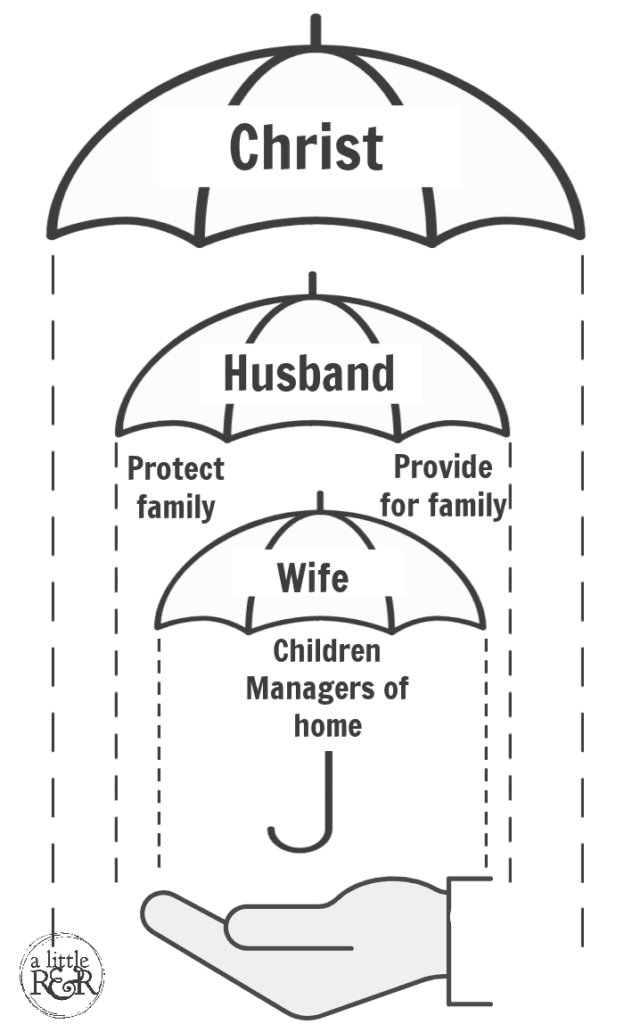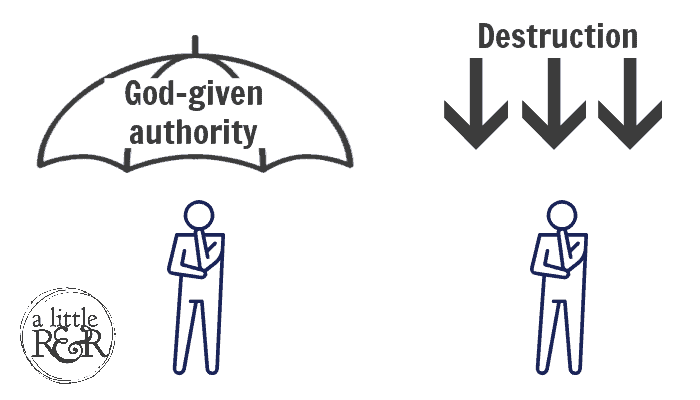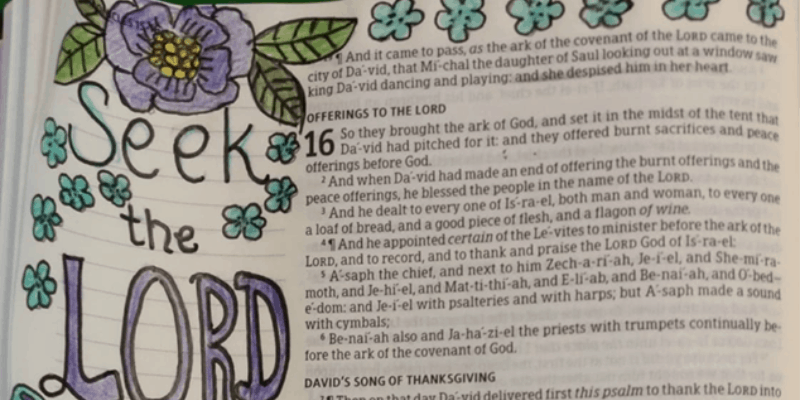The Umbrella of Protection – Biblical Context of Authority
I hope you love the products and resources I recommend here at A Little R & R. Just so you know, it is possible that I get a commission and collect income from the links on this page. Click here for more info.
What is the biblical context of authority and the chain of command that God teaches?
Was the idea of patriarchy, submission, and male authority just a cultural standard in the Bible, or does it apply today?
If it does apply today, how does that fit in with the idea of freedom in Christ, and Paul’s declaration in Galatians 3:28 “There is neither Jew nor Greek, there is neither slave nor free, there is neither male nor female; for you are all one in Christ Jesus.”
The Umbrella of Protection – Biblical Context of Authority
One of the teachings of Bill Gothard that has received the most pushback is his teaching of the Umbrella of Protection.

In this teaching, it is taught the chain of command, starting with Christ, then the husband over the family, and the wife over the children, all resting in Christ’s hand.
The umbrella provides protection for the family from Satan’s arrows.
In his teaching, problems arose when one of these umbrellas didn’t function properly, holes appear in the umbrella, and protection is lost.
Or if one were to step out from under their umbrella, they become a target for the enemy.

The question is this: Is this teaching biblical and if not, should we throw it out or put it back into biblical context?
One of the concerns I have had with the flood of testimonies from ex-ATI students is the readiness to discount every teaching of Bill Gothard.
To be fair, he taught a lot of personal opinions as scriptural principles, and in the end, became legalistic even to the point of distorting the salvation message.
However, some of his teachings were rooted in biblical truth, and it is our duty to take those teachings, return them to proper biblical context, and hold on to them.
Christ is the head
This is a truth that I believe no disciple of Jesus Christ will refute.
Christ is above all: family, church, and government. As our ultimate authority, if one of the lesser authorities demands that we violate Scripture, and will not accept our appeal, we are responsible to obey Christ above all.
We see this illustrated in Acts 5, when Peter and the apostles were on trial before the High Priest for preaching the gospel and replied, “We ought to obey God rather than men. (v. 29)”
Under Christ, and answerable to Him, are government, Church, and the husband/father.
The Husband is Head of the Wife
“For the husband is head of the wife, as also Christ is head of the church; and He is the Savior of the body.” Ephesians 5:23
While this may be controversial to some, it is Scriptural and the biblical context for authority.
God ordained man to be above woman from the very creation of man.
He first created Adam out of dust and then created woman from the side of man.
He didn’t create them the same way, and he didn’t create them to be equal in authority.
The wife is the manager of the home and the children
While once again, this may seem like an outdated concept of gender roles, one that society is working hard to erase, I do believe it is scriptural.
Titus 2 says:
the older women likewise, that they be reverent in behavior, not slanderers, not given to much wine, teachers of good things— that they admonish the young women to love their husbands, to love their children, to be discreet, chaste, homemakers, good, obedient to their own husbands, that the word of God may not be blasphemed.
Titus 2:3-5
So, we see that this structure of authority is biblical.
Is the concept of the umbrella being the protection, or holes in the umbrella putting the family in danger, correct?
But what about Galatians 3?
In Galatians 3:28, when Paul said “… there is neither male nor female”, he wasn’t referring to our equality in authority, but our equality in Christ.
We are equally accepted in Christ even though our levels of authority may differ.
A person’s level of authority doesn’t determine their value to God and it should not determine their value to the family.
We are equally valuable, even though our roles and authority may differ.
Holes in the Umbrella of Protection
We know that there will never be holes in Christ’s umbrella of protection; He is divine and according to His nature is without sin.
What happens if the husband sins? Are the wife and children then in danger of satanic destruction?
What happens if the husband is unsaved or walks away from the faith?
This is where I believe that this teaching began to veer away from biblical context. For many, it created fear and didn’t accurately teach God’s grace.
Will the husband sin and fail? Yes. That is where God’s grace comes in like a flood to cover over our imperfections.
If a family is led by a husband who is not saved, and who doesn’t accept Christ’s authority, they are still covered by the protection of Christ.
Does the umbrella promise protection from evil
Many Christians put their trust in formulaic Christianity thinking if they follow certain guidelines, it will protect them from bad things and guarantee their children will follow Christ.
However, Christianity isn’t formulaic, it is a walk of faith.
We see this clearly in the story of Job. Job’s friends had a formulaic approach to God’s blessing: If you follow these guidelines, God will bless you. If you don’t, He will curse you.
Job had experienced tremendous loss, and to them, that meant that Job must have sinned; because if he hadn’t sinned, God would have protected him from what they deemed a curse.
At the end of the book of Job, God shows up and sets the record straight.
If our ability to perform Christianity provides a layer of protection against evil, there is no need for God’s grace and Jesus’ shed blood was unnecessary.
The truth is, we will not ever perform Christianity adequately enough to ensure that evil will never happen to us or our loved ones.
We don’t barter with God and His blessings are not earned.
Furthermore, there is no reason to live in fear that if we step out of line for a moment we are in danger of horrible things happening to us.
Does not His Word say His love is everlasting?
But the mercy of the Lord is from everlasting to everlasting on those who fear Him, and His righteousness to children’s children,
Psalm 103:17
God isn’t up in heaven waiting to remove His hand of protection over us each time we slip up.
That is not the God we serve.
We live in a fallen world where bad things happen to good people. But as disciples of Christ, we have an iron-clad promise from God:
And we know that all things work together for good to those who love God, to those who are the called according to His purpose.
Romans 8:28
Biblical authority is rooted in trust
What is missing from this teaching on authority is trust in God.
All submission, whether it is children submitting to their parents, a wife submitting to her husband, or believers submitting to Christ, is an act of faith and trust.
Submission is a choice to lay down our right to the last word and trust that the final decision of our authority will be for our good.
That is an act of faith.
And when we choose to live a life of submission, God will honor that faith.
Will bad things happen sometimes? Yes, they will. We live in a fallen world where bad things happen despite our best efforts to follow Christ in everything we say and do.
But God’s promise is that He will turn all things for our good.
The Biblical principle of authority
After reading and listening to many stories of children raised under this teaching, I have been convinced that perhaps the greatest failure in this teaching is understanding the biblical principle of authority.
The vast majority of stories illustrate a top-down, oppressive, dictatorial, intimidation-driven authority structure in the home.
Clearly, this violates Paul’s instruction, “And you, fathers, do not provoke your children to wrath, but bring them up in the training and admonition of the Lord.” Ephesians 6:4
Many of these stories include tales of physical abuse (not discipline) as well as sexual abuse.
In the Gospels, we read a story that clearly outlines the biblical principle of authority that ties all of this together in a beautiful picture of Christ’s submission to Father God.
In Matthew 8, a Roman centurion came to Christ begging him to heal his servant.
Jesus replied, “I will come and heal him.”
The centurion then said something very interesting. He told Jesus that it was sufficient for Him just to speak a word for his servant to be heal.
For I also am a man under authority, having soldiers under me. And I say to this one, ‘Go,’ and he goes; and to another, ‘Come,’ and he comes; and to my servant, ‘Do this,’ and he does it.
Matthew 8:9
This centurial, in one sentence, illustrated biblical authority.
“For I also am a man under authority, having soldiers under me.
He was both in authority and under authority. He was both accountable to someone and held others accountable.
Furthermore, his use of the word also illustrated his understanding that this is how Jesus related to God.
Jesus said, “For I have come down from heaven, not to do My own will, but the will of Him who sent Me.” John 6:38
Jesus had all authority and yet was still submitted to the will of His Father.
My Final Conclusion:
While the illustration and teaching of the Umbrella of Protection aren’t necessarily unbiblical, it only works in its original form when each member of the family is submitted to Christ.
Problems arise with it when the husband or wife is not functioning in their proper role.
When the husband isn’t submitted to Christ, isn’t loving his wife as Christ loves the church, or isn’t gentle and loving with his children, the wife and children come under the protection of Christ.
I look forward to sharing more on this in a later post.
Understanding biblical submission and authority is essential for the disciple of Jesus Christ.
Walking in rebellion does remove God’s hand of protection over us, but this differs greatly from the disciple of Christ who makes a wrong decision.
That differentiation must be made.
Furthermore, walking in biblical submission should not breed fear. It should build faith and trust.
Any submission that breeds fear is not biblical submission.
So, while I do not entirely discount the illustration of the Umbrella of Protection, I feel that perhaps it is better illustrated as a walk of faith, rather than an umbrella.
What are your thoughts? Feel free share in the comment section below.
Get instant access to over 100 FREE Printables today without ever having to enter your email in again! Become a member of my Printable Library on Buy Me a Coffee today!








